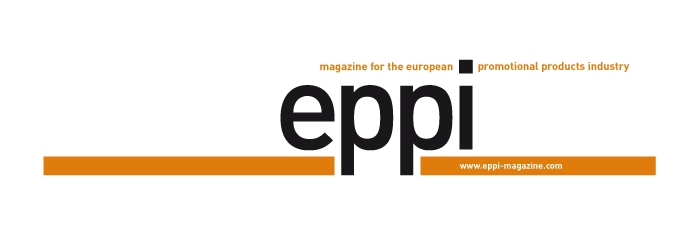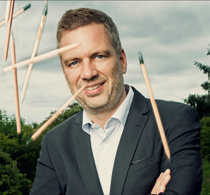Since 2013, the Danish company, Sprout World, has been selling its patented pencils, which after their lives as writing instruments can be planted and thus ultimately grow into herbs, flowers or vegetables. Michael Stausholm, Chairman of the Board of Sprout World, spoke with eppi magazine about the story behind the Sprout Pencils and about how important sustainability is – particularly also during the Corona crisis.
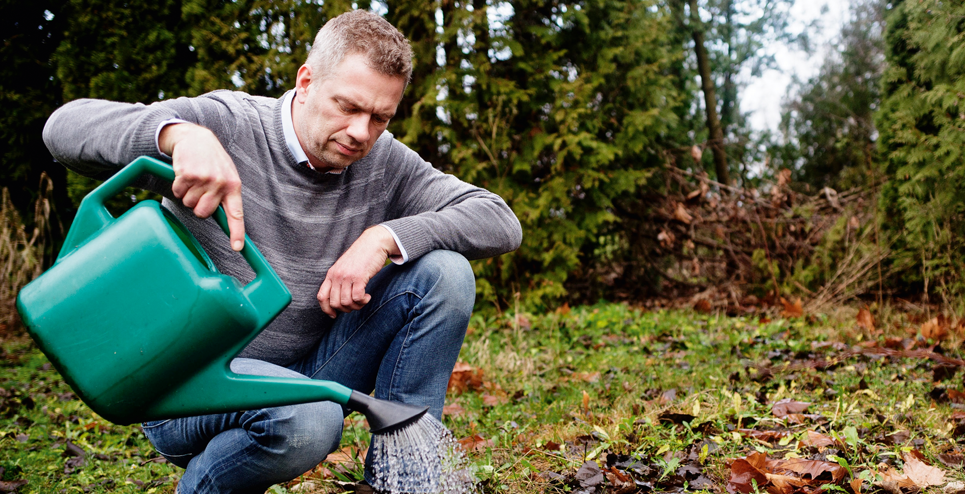
Mr. Stausholm, you have built up a successful company with the Sprout Pencil. What is the story behind its inception?
Michael Stausholm: The idea was devised by a group of robotics students at the MIT (Massachusetts Institute of Technology), who were assigned in 2013 with the task of designing the office of the future for a product design course. Although they were technology students, they focused on analogue writing instruments and developed a pencil with a seed capsule that could be planted when it had become too short to write with. The wood and the capsule made of plant-based material disintegrate over time, while the seeds begin to sprout. The students presented the project on the crowdfunding platform, Kickstarter, where I discovered it. It impressed me immediately, so I purchased the corresponding rights to be able to sell the pencil in Europe and founded Sprout World. In the first summer we sold 70,000 pencils in Denmark alone. In 2014, I purchased all of the patents and rights for the Sprout Pencil and the MIT students withdrew from the project. From that point on we expanded very quickly and have sold more than 25 mil. Sprout Pencils to-date.
What significance does sustainability have for your corporate philosophy?
Michael Stausholm: The Sprout Pencil has become a symbol of sustainability to many businesses. It creates no waste but on the contrary it gets a new life after death. This fact makes it a strong conversation starter and a great messenger when a business wants to communicate their green and good initiatives. However, it can only serve as a real alternative to conventional pencils and plastic pens if all of the production steps are sustainable. That is why we exclusively use PEFC and FSC-certified wood and GMO-free seeds. Furthermore, no chemicals are used in our pencils and they are certified according to the European toys standard EN-71. In order to keep the transport routes on the European and North American market down to a minimum, we don’t import goods from the Far East and produce our pencils in Poland and the USA. This is the only way to guarantee a really sustainable product.
Which message does the Sprout Pencil convey?
Michael Stausholm: Terms such as sustainability, climate change and CO2 reduction are very abstract. It is difficult to understand what role the climate change plays in why the polar bears in Greenland can’t find food anymore for instance. Its’s easier to comprehend why organic meat is better than conventional meat or why eco-friendly packaging is better than that made of plastic. The same is true of our products. They make sustainability visible and comprehendible. We can’t save the world with our Sprout Pencils. However, we want to inspire people to take more sustainable decisions in their everyday lives. Because if we all rally together on this front, it has a large impact.
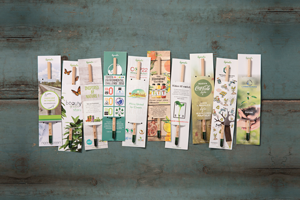
Engraved messages and individually designed, FSC-certified packaging make the Sprout Pencils convincing advertising media.
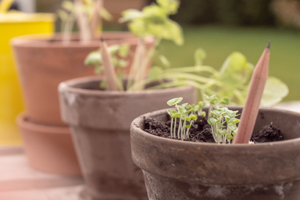
Second life: as soon as the Sprout Pencil has had its day as a writing instrument, it can be planted. Flowers and Co. will sprout from the seed pods.
Michael Stausholm: 75% of our employees are female. During a brain-storming one of our employees suggested we develop a make-up pencil. I didn’t think it was a good idea. But she argued that women often use several eyeliners, lipliners or eye pencils, which causes a lot of unnecessary plastic waste. And in proof of this several employees emptied their handbags and showed me their make-up pencils – some of them were actually carrying six or seven with them. So, it occurred to me that the market is much larger than I thought. After four years of development time, today we collaborate with Faber-Castell and Schwan Cosmetics. They produce the pencils and we then combine them with our seed capsules. We are currently working on an allergy-friendly model. We are in dialogue with some of the big cosmetic brands that are interested in incorporating our plantable makeup pencil into one of their product lines. And we are endeavouring to introduce the liner on Amazon later this year.
Following the success of the pencils, you launched the Sprout Spoon onto the market. What is the idea behind this and how does it work exactly?
Michael Stausholm: A German inventor came up with the idea of the sustainable teaspoon as an alternative to conventional plastic spoons. When one orders a cup of tea on an airplane, as a rule one is given a tea bag, a plastic spoon and a serviette to place the used tea bag on. In the case of the Sprout Spoon, none of this is needed: A tea bag is namely attached to the spoon made of bio-degradable cardboard. After usage the tea bag is simply squeezed and the spoon is folded so that the surface it lies on doesn’t get wet. The Sprout Spoon is imprinted using 100% plant-based, TÜV-tested dyes and after disposal decomposes completely within two months. The Sprout Spoon is another ideal green promotional product because it can be customised with a company logo and colours.
Your customers include global players such as Porsche, Mercedes and Ikea. Which campaigns have impressed you the most that involved the implementation of Sprout Pencils?
Michael Stausholm: Our products have already been implemented in many great campaigns. Ikea used the Sprout Pencils to support its sustainability report, Bacardi distributed them together with mint seeds and an enclosed Mojito recipe and Richard Branson presented them to the visitors of his private island. But we are particularly proud of the fact that the Obamas used our pencils. The pencils were handed out to the participants and speakers of a conference in Portugal and Barack Obama was one of the speakers. Six months later an agency that represents big stars like Pink or Lady Gaga called me. The thought that we were expecting an order for a famous person was really exciting. When in a follow-up conversation the agency mentioned that the order was for an author, I was disappointed at first that it wasn’t actually a big star. But when the order arrived, the name on the order was “For Michelle Obama”, which we were delighted about.
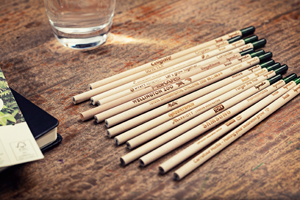
With their double use as a writing instrument and planting aid, the sustainable wooden pens convey green messages more impressively than conventional giveaways.
You were recently voted as the second most innovative company by Fast Company. What does this mean to you?
Michael Stausholm: It was definitely crazy to be mentioned on the same list as innovative, technically-oriented global players such as Siemens and Tesla. Furthermore, our Sprout Spoon was distinguished in 2019 in Italy as being the most innovative marketing product by the leading Italian marketing media MediaKey. We are very proud that a green, sustainable firm like ours can assert itself on the market. This proves that the focus on environmental protection and sustainability is growing. We sold around 8 mil. pencils in over 80 countries in the past year alone and approx. 25 mil. altogether since we started in 2013. I am always delighted even after seven years to see people from all over the world posting photos on the social networks of them planting our pencils and making the world slightly better.
The promotional product industry is, however, struggling at present. How is the Corona crisis effecting you and your company and how are you reacting?
Michael Stausholm: After we had grown by 100% in the first quarter compared to the same period of the previous year, the orders declined significantly from March onwards. Our largest markets are Germany, Italy, France and the USA – i.e. countries that have more or less been experiencing a complete lockdown over the past weeks. The demand for writing instruments simply doesn’t exist. Luckily we are still receiving orders, but we too are noticing that the promotional products market has come to a standstill. We already sent all of our employees in Europe and the USA to work in home offices on March 10. The production is continuing as normal, however we have implemented diverse hygiene measures in order to minimise the risk of infection at the production sites. We have on the other hand further expanded our marketing activities. We want to demonstrate and emphasise the fact that we are still capable of operating even during the current situation.
When companies have to save money in times of crisis, the marketing budget is often the first to be axed. What form is the PR work taking on in the Corona era?
Michael Stausholm: Crises often lead to financial difficulties, but companies should carefully consider where to save money. The key phrase here is “remaining visible”. The target group will quickly forget companies that axe their marketing measures. Those companies that emphasise their presence during times of crisis, will make a positive impression and can perhaps profit from more orders once the crisis has been overcome.
Will companies in future tend to fall back on products that are favourably-priced, rather than sustainable because they have less money at their disposal due to the crisis?
Michael Stausholm: I don’t think so. Of course, companies have to save money in times like these, not only on advertising, but also in other areas. However, sustainability is just as much a global theme as Corona, and it isn’t going to disappear just because we are currently experiencing a pandemic. Indeed we are actually observing that both our customers and the users are meanwhile demanding products that are more sustainable. If the recipients no longer want to use conventional products, from a company’s point of view it makes no sense to continuing implementing them. Sustainability is here to stay.
Hence quality before quantity?
Michael Stausholm: Precisely. After the last financial crisis people started thinking more consciously about what and how much they buy. But after a while they began ordering cheap products from China again and the buying impulse got out of hand. I am perceiving the current crisis as a sharp wake-up call. We have to distance ourselves from this consumption frenzy and start taking conscious, sustainable purchasing decisions. And we are observing that more and more customers are understanding why it is better to purchase less and opt instead for a better product that is kind to the environment, which the recipient actually wants.
Sustainability was a mega trend prior to the outbreak of the COVID-19 pandemic – key word: Fridays for Future. However, over the past months the theme has faded more into the background of the public eye. What role will a sustainable attitude play after the crisis?
Michael Stausholm: Corona is forcing us to change our behaviour, which is not necessarily pleasant for us, but which is having a very positive effect on nature. The crisis has for instance demonstrated that it is important not to be dependent on the Far East for everything. As a reaction to this, companies could produce locally in future. The number of business trips could be easily reduced too. For example, I am much more effective when working from my home office. Whereas I used to spend an hour driving to the office for a meeting before the crisis, today I can accomplish many tasks within a few minutes per telephone or video chat. This saves me time and by not driving I am protecting the environment. For the good of the environment, we should keep these changes in place instead of reversing them.
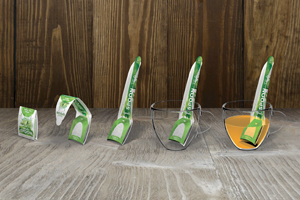
The most recent member of the Sprout family: The Sprout Spoon made of FSC-certified cardboard proves to be an environmentally friendly alternative to the plastic spoon.
Are you already seeing signs that changes will be upheld long-term?
Michael Stausholm: The measures for more environmental protection are not sufficient by far, but we are observing gradual and constant progress here. For example, in Denmark – and also in other countries – there is a trend towards the consumption of less meat. Most people don’t refrain from eating meat because it is healthier for them, but because they know it is better for the environment. Environmental protection is not a “feel good” thing that one can use to brag on Instagram. It is simply something we have to do in order to preserve our earth. Whether travelling, food or consumption – people are becoming more aware about the implications of their actions and that is an important step.
Nobody can say how long the effects of the current crisis will accompany us, but there will be a life after Corona. Do you already have any plans? Are you working on new products?
Michael Stausholm: My dream is to develop a plantable ballpoint pen made of wood. The problem is that hitherto it has not been possible to make the mechanical parts inside the ballpoints out of any other material except metal or plastic. The market for ballpoint pens is huge. 125 million pens are produced worldwide every day. That is a crazy amount and leads to an enormous heap of waste that could be avoided if the ballpoint pens were bio-degradable. We are working flat out on the development and I am sure we will crack the code one day and be able to produce a wooden ballpoint pen.
// Laura Müller spoke with Michael Stausholm.
Photos: Sprout


